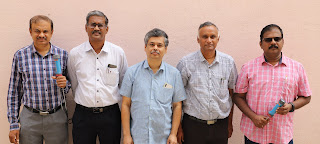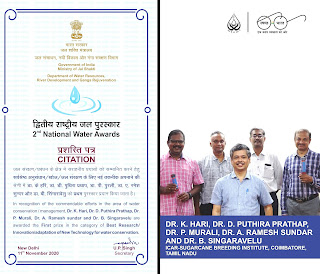18-19 October 2019
GENERAL CIRCULAR - I
Dear Sir/Ma’am,
The 50th Sugarcane Research & Development Workshop [Golden
Jubilee] of Tamil Nadu & Puducherry would be held during October
18-19, 2019 (Tentative) at Chennai
to discuss the following topics. The exact venue will be intimated shortly.
i.
Review
of action taken on the recommendations of the previous workshop
ii.
Wide
row planting with Intercropping
iii.
Review of
Sugarcane mechanization initiatives including mechanical harvesting
iv.
Current
varietal position and Performance of new sugarcane varieties
v.
All
India Co-ordinated Research Project on Sugarcane, Co-ordinated agronomic
experiments/Adaptive Research Trial and SBI-SISMA/SBI-TNCSF Varietal trials
vi.
Sugarcane
seed nursery programme
As was done during the previous year, the "Dr. N. Mahalingam Memorial Lecture" would be delivered and prizes would be awarded for best presentations by the factory
personnel, during the workshop.
‘Cheyyar Co-op. Sugar Mills ltd., Anakkavoor, would be hosting the Workshop. You are cordially invited to attend this Workshop
along with your colleagues and participate in the deliberations. You may please
prepare the manuscripts of the papers covering these topics as per the
guidelines enclosed and send the same to the undersigned by September 27,
2019 . The guidelines can also be downloaded from http://sugarcane.res.in or http://caneinfo.icar.gov.in
As we are
planning to bring out the papers presented at the workshop in printed form (Compendium of Research Articles & Status
Papers; ISSN: 0973-8185), your papers may be prepared and sent to the
undersigned in time. The papers (prepared using MS Word 2003) can be sent by email to sbiextension@yahoo.com. Presentations, created in Microsoft
PowerPoint 2003/2007 format (.ppt/.pptx), should fit within the allotted time
in the Technical sessions.
With best regards,
Yours sincerely,
DIRECTOR, ICAR-SUGARCANE BREEDING INSTITUTE
_________________________________________________________________
Telephone Nos.:
Office: EPBX: 0422- 2472621 Extn :
238, 2472986 (Thro'PA) Fax: 0422-2472923
GUIDELINES FOR PREPARING PAPERS
Topic
i : Review of action taken on the recommendations of the previous workshop
Sugar
factories/Department of Sugar/Department of Agriculture and research
institutions in the region are requested to furnish the details of action taken
on the recommendations made in the previous workshop as per the details given
hereunder:
|
S.
No
|
Recommendation/Action
point
|
Action taken
|
-
|
As most of the sugar mills had expressed water as the major constraint,
all the factories should increase the area under micro irrigation to sustain
sugarcane productivity.
|
|
-
|
Sugar factory personnel need to monitor settling transplanting, micro
irrigation, wide row planting and soil test based fertilizer application in
the farmers’ fields & identify and document the problems being faced by
the farmers in adoption.
|
|
-
|
In order to facilitate large-scale
adoption of sugarcane mechanization, all the factories should strive to achieve at
least 50 % of cane area to be planted under wide row spacing 4 ft and 5 ft
during the ensuing planting season.
|
|
-
|
The sugar factories
should mobilize adequate number of power tillers, mini tractors, disc harrows
and trash shredders to ensure 100 % coverage of mechanized inter cultural
operations in all the cane fields to be covered under wider row spacing
during the ensuing season.
|
|
-
|
In order to enable the
farmers to derive the benefits of sugarcane mechanization including
mechanical harvesting, the factories who have not so far acquired any
harvester machine either by the mills themselves or by the entrepreneurs
should plan to cover at least 500 acres under wider row cane planting during
the forthcoming season and make available 15,000 MT of cane for harvesting
through machine. The sugar mills also should plan to acquire one harvester
machine through entrepreneur.
|
|
-
|
The sugar mills from all
the sectors should assess their requirements of farm implements and machinery
like power tillers, mini tractors, trash shredders, trash incorporators, disc
harrows etc., and place their indents for getting allotment of NADP subsidy
through respective Agrl. Engineering department in their district. The Chief
cane development officer, TASCO may coordinate with all the sugar mills to
get the budget allotment through the office of Commissioner of sugar.
|
|
-
|
As
the performance of Co 0212 has been found to be promising at Sakthi sugars,
Appakudal, the sugar factories could conduct BMT at monthly intervals and
data reported for the benefit of other factories
|
|
-
|
Factories
are urged not to cultivate too many varieties in their area
|
|
-
|
Any
clone sent out of the research stations in Tamil Nadu for testing purpose
should have Co as prefix to C or G or Si for uniformity.
|
|
-
|
Factories
should ensure participation in the interactive meets organized by ICAR-SBI
under the quality seed supply programme
|
|
-
|
Systematic
adoption of TC plantlets should be taken up by the factories
|
|
Topic
ii: Wide row planting with
Intercropping
Area covered under wide row spacing in
the factory area - extent of adoption of wide row spacing by farmers - yield
improvement/reduction than normal row spacing - performance of varieties in 90,
120, 150 cm spacing or above - merits and demerits of wide row spacing -
package of practices used for wider row spaced sugarcane - cost effectiveness
of wide row spacing compared to normal row spacing – Area and percentage under wide
row spacing with intercropping (Please provide in tabular form). Intercrops
commonly being used in your factory area – selection criteria used for
intercrops –Package of practices - Planting methods including spacing – effect
of intercropping on tillering - Water management measures - labour requirement
– Input use-Plant protection measures used – Time of harvest & harvesting
techniques - ease of mechanization -
average cane yield levels and net returns obtained with different intercrops–
best combination observed in your factory area - advantages of wide row
planting with intercropping as perceived by cane development personnel and
farmers of your factory area– demerits/problems in adopting wide row planting
with intercropping - constraints in adoption – promotional efforts taken up
(like demonstrations) for increasing area under wide row planting with intercropping-
cases of successful farmers who had taken up wide row planting along with intercropping.
|
S.No.
|
System (Under wide row planting)
|
Coverage
(ha.)
|
Average cane yield (t/ha)
|
Duration
of Intercrop in the field
(eg. Up to three months)
|
Average intercrop yield (t/ha)
|
|
|
Sole
sugarcane
|
|
|
-
|
-
|
|
|
Sugarcane
+ Intercrop – 1 (Specify)
|
|
|
|
|
|
|
Sugarcane
+ Intercrop – 2 (Specify)
|
|
|
|
|
|
|
Sugarcane
+ Intercrop – 3 (Specify)
|
|
|
|
|
Topic iii: Review of Sugarcane
mechanization initiatives including mechanical harvesting
Usage of implements in sugarcane cultivation – sugarcane planter –
intercultivator – earthing up ridger – stubble shaver - offbarrer- combined
ratoon manager - weeder – rotovator trash shredder – Extent of mechanization in
farmers’ fields (area & %) across different soil types – saving in labour,
time and cost - merits and demerits in mechanization – scope for mechanization
in farmers’ fields – cost effectiveness in mechanized and non-mechanized cane
farms - perception of farmers towards mechanization – steps initiated to
popularize mechanization in sugarcane – constraints in adoption of sugarcane
mechanization.
Mechanized
harvesting – machines used, cost of machines, hiring charges of harvester, cost
of maintenance harvester, spacing adopted, capacity of the machines, area
covered (area and % of total cane area), extraneous materials in machine
harvested cane, pros and cons of mechanized harvesting – steps initiated to
popularize mechanization in sugarcane – constraints in adoption of sugarcane
mechanization; impact of mechanized harvesting on juice quality /sugar
recovery.
Topic iv: Current varietal position and
Performance of new sugarcane varieties
Varietal position
Sugar
factory personnel to provide the following details:
2016-17
|
S.No
|
Variety
|
Area covered
|
Percentage
|
Highest yield
t/ ha
|
Yield at the time of introduction (t/ha) (Mention
year)
|
Yield, at present (t/ha)
|
|
|
|
|
|
|
|
|
|
|
|
|
|
|
|
|
2017-18
|
S.No
|
Variety
|
Area covered
|
Percentage
|
Highest yield
t/ ha
|
Yield at the time of introduction (t/ha) (Mention
year)
|
Yield, at present (t/ha)
|
|
|
|
|
|
|
|
|
|
|
|
|
|
|
|
|
2018-19
|
S.No
|
Variety
|
Area covered
|
Percentage
|
Highest yield
t/ ha
|
Yield at the time of introduction (t/ha) (Mention
year)
|
Yield, at present (t/ha)
|
|
|
|
|
|
|
|
|
|
|
|
|
|
|
|
|
Performance
of new sugarcane varieties
Scientists
from ICAR-Sugarcane Breeding Institute, Coimbatore & Sugarcane Research
Stations of Tamil Nadu Agricultural University would be presenting the
characteristics of new sugarcane varieties and their performance in different
regions. Participants may present their
observations on the performance of these varieties especially with reference to
cane yield (average and highest yield recorded) quality (including SMT and BMT
results), performance in different soil types and months of planting, optimum
age at harvest and incidence of pest and diseases, tolerance to abiotic
constraints like drought, water-logging etc. may also be indicated.
Topic v:
All India Co-ordinated Research Project on Sugarcane, Co-ordinated
agronomic experiments/Adaptive Research Trial and SBI-SISMA/SBI-TNCSF Varietal
trials
The
results of AICRP (S) trials, CAE/ART trials and SBI-SISMA/SBI-TNCSF trials conducted
during the previous crop season would be presented by the Research Institutions
and Sugar mills.
Topic vi: Sugarcane seed nursery programme
Details of three–tier seed
nursery programme adopted by the factory to sustain the yield of sugarcane
varieties to be provided.
|
Particulars
|
Area in
hectares
|
|
Sector I
|
Sector
II
|
Sector
III
|
|
Area
under primary nursery
Variety
1.
Variety
2.
Variety
3.
|
|
|
Area
under secondary nursery
Variety
1.
Variety
2.
Variety
3.
|
|
|
Area
under commercial nursery
Variety
1.
Variety
2.
Variety
3.
|
|
Breeder
seed production programme of ICAR-Sugarcane Breeding Institute and Tamil Nadu
Agricultural University would be discussed.
Sugar factories may indicate their breeder seed requirements for the
ensuing season.
Please note:
Kindly provide the data in tabular form, wherever required. You may
include additional information if you feel that this would help in enhancing
the purpose of the workshop. Please restrict your paper to the main themes of
the workshop only.





